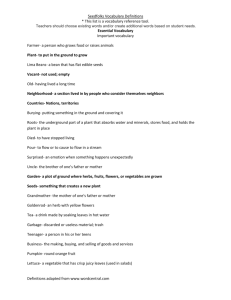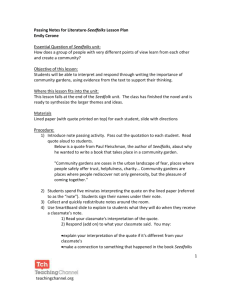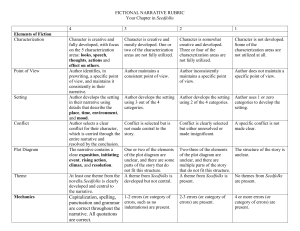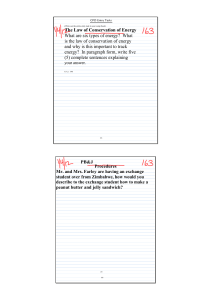Document
advertisement
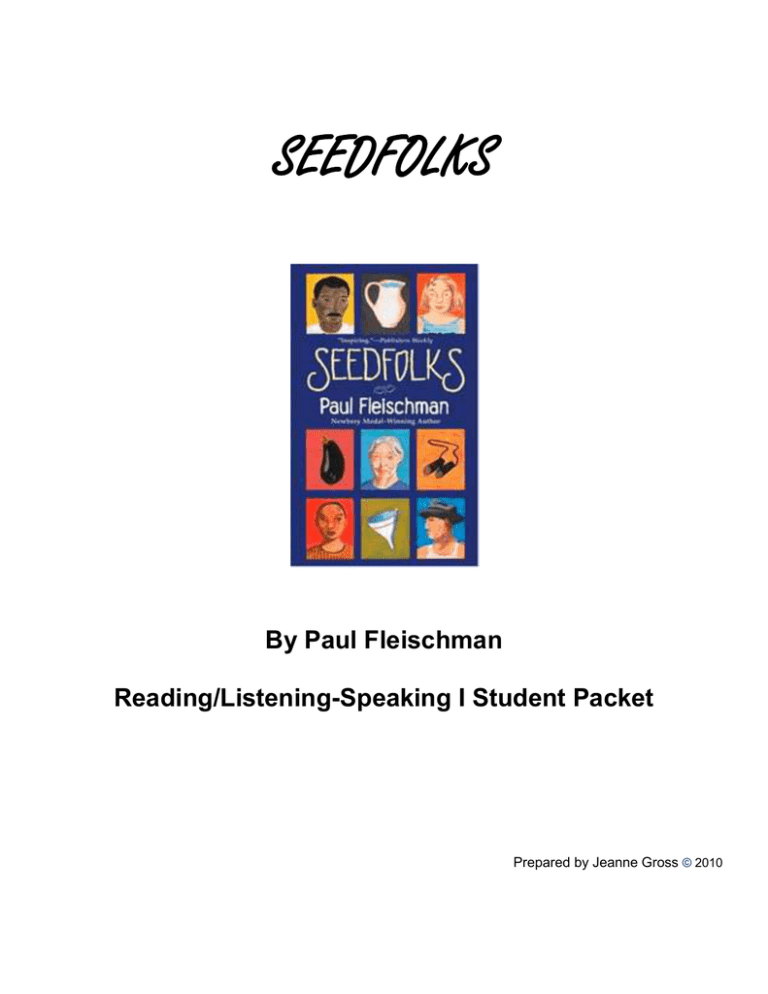
SEEDFOLKS By Paul Fleischman Reading/Listening-Speaking I Student Packet Prepared by Jeanne Gross © 2010 2 Name: Chapter 1, Kim Pre-Reading Vocabulary: Directions: Read these before you read the text. 1. 2. 3. 4. 5. 6. 7. 8. p. 1 altar (n)-- An altar is a structure where offerings are made for religious purposes. p. 1 stern (adj) – Stern is similar to serious or strict. p. 2 tiptoed (v) — When you tiptoe, you walk quietly and carefully. p. 2 marble (n) —Marble is a type of rock, and it is very hard. p. 3 scouted (v)—To scout means to look around trying to locate something. p. 3 rusty (adj) Metal that is changed by rain is rusty. p. 4 plump (adj) — Plump is similar to fat and healthy. p. 4 vowed (v) –When you vow, you make a promise. Selected Vocabulary: Directions: Choose 3-5 vocabulary words that you want to learn. Write the page number and sentence in which the words appear. Underline the word, write an appropriate meaning, and then write your own sentence. Example: p. 1, I stared at my father’s photograph—his thin face stern, lips latched tight, his eyes peering permanently to the right. (looking carefully) --The child peered into the window, looking closely at the candy. 1. 2. 3. 4. 5. Seedfolks Log by Jeanne Gross © 2010 3 Comprehension Questions: (Use complete sentences.) Example: 1. How old is Kim? Kim is nine years old. 2. Where is she planting the beans? 3. Where did Kim learn to grow beans? 4. What is Kim’s promise? 5. Where is she from? Reflection : (Write an interesting, meaningful passage from the text. Write what you think it means within the text, and write a personal reflection indicating why it interests YOU.) Example: Text: “I would show him that I was his daughter.” (p. 4) Reflections: This sentence shows that Kim wants to please her father. She did not know her father because he died before she was born. However, she knows he was a farmer. So, she wants to grow beans like him. I like this sentence because I think that all children want their parents to be proud of them. I was very lucky to have a mother who often told me she was proud of me. Text: Reflections: Seedfolks Log by Jeanne Gross © 2010 4 E. Grammar Exercise: Directions: Change these sentences from present tense to past tense. Example: 1. Kim’s father is a farmer. Kim’s father was a farmer. 2. Kim takes some beans from the kitchen. 3. Kim goes to an empty lot. 4. Kim begins to dig a hole. 5. Her class plants beans. Seedfolks Log by Jeanne Gross © 2010 5 Name: Chapter 2, Ana Pre-Reading Vocabulary: Directions: Read these before you read the text. 1. 2. 3. 4. 5. p. 5 sliver (n)— A sliver is a piece of something. p. 6 very (adj)—Here “very” means “same”. p. 7 suspiciously (adv) – When you look “suspiciously”, you believe there is a problem or something bad. p. 7 bury(ing) (v) – To bury means to put something into the ground. p. 8 Parole (n) – The Parole department is an office of the government that deals with people who have broken the law. 6. p. 8 crouch(ed) (v) – When you crouch, you stoop, or bend over. 7. p. 9 hobble(d) (v) – To hobble means to walk unevenly, without full balance. 8. p. 9 hack(ed) (v) – To hack means to cut. 9. p. 9 rip(ped) (v) – To rip means to pull out. 10. p. 10 peek(ed) (v) – To peek means to look out in a secret way. Selected Vocabulary: Directions: Choose 3-5 vocabulary words that you want to learn. Write the page number and sentence in which the words appear. Underline the word, write an appropriate meaning, and then write your own sentence. Example: p. 1, I stared at my father’s photograph—his thin face stern, lips latched tight, his eyes peering permanently to the right. (looking carefully) The child peered into the window, looking closely at the candy. 1. 2. 3. 4. Seedfolks Log by Jeanne Gross © 2010 6 5. Comprehension Questions: (Use complete sentences.) 1. Where is Ana from? 2. Has Ana lived in her apartment for a long time? 3. Do the people in the neighborhood stay the same or do they change? 4. What does Ana think Kim is doing in the lot? 5. What does Ana do when she first goes to the lot? 6. How does she feel about what she did? 7. What do you think this sentence on page 10 means, “That afternoon I bought some binoculars.” Reflection : (Write an interesting, meaningful passage from the text. Write what you think it means within the text, and write a personal reflection indicating why it interests YOU.) Example: Text: “I would show him that I was his daughter.” (p. 4) Reflections: This sentence shows that Kim wants to please her father. She did not know her father because he died before she was born. However, she knows he was a farmer. So, she wants to grow beans like him. I like this sentence because I think that all children want their parents to be proud of them. I was very lucky to have a mother who often told me she was proud of me. Text: Reflections: Seedfolks Log by Jeanne Gross © 2010 7 Grammar Exercise: Directions: Several sentences in this chapter are “fragments”, which means that they are not full sentences because they do not have both a subject and a verb. Make these fragments complete sentences by adding missing subjects or verbs. (There is not just one right way to correct these sentences. Try it!) Example: 1. Staying and staring out this window. I am always staying and staring out this window. 2. (I’ve seen history out this window.) So much. 3. Men with no work drinking from nine to five. 4. Down in the lot, a little black girl. 5. (A lot of Slovaks and Italians moved in next) Then Negro families in the Depression. Seedfolks Log by Jeanne Gross © 2010 8 Name: Chapter 3, Wendell Pre-Reading Vocabulary: 1. p. 11 suits me fine (expression) – This means that I like it or that the situation fits me well. 2. p. 12 wilt(ed)—(adj from a verb form) – When a plant is wilted, it is not straight because it needs water. 3. p. 12 flop(ped) -- (adj from a verb form) – When a plant is flopped over, it has fallen down. 4. p. 14 stone-still (adj) This is a word the author created to mean “very still.” 5. p. 15 moan(ing) (adj from a verb form) – To moan means to cry or complain. 6. p. 16 squat(ted) (v) -- To squat means to lean down. Selected Vocabulary: Directions: Choose 3-5 vocabulary words that you want to learn. Write the page number and sentence in which the words appear. Underline the word, write an appropriate meaning, and then write your own sentence. 1. 2. 3. 4. 5. Comprehension Questions (Use complete sentences) 1. Where is Wendell from? Seedfolks Log by Jeanne Gross © 2010 9 2. What do you think Wendell’s job is? 3. How did Wendell help save Kim’s beans? 4. What do you think Wendell is planning to do on Tuesday? 5. Why does Wendell dislike telephone calls so much? Reflection: (Write an interesting, meaningful passage from the text. Write what you think it means within the text, and write a personal reflection indicating why it interests YOU.) Text: Reflections: Grammar Exercise: Directions: Change these sentences to questions. Example: Wendell is from Kentucky. Where is Wendell from? or, Is Wendell from Kentucky? 1. Wendell is Ana’s friend. 2. Wendell knows a lot about farming. 3. Kim is afraid of Wendell. 4. Wendell brought home a shovel from work. 5. Wendell is inspired by Kim. Seedfolks Log by Jeanne Gross © 2010 10 Name: Chapter 4, Gonzalo Pre-Reading Vocabulary: 1. p. 17 equation (n) – A mathematical formula is an equation. For example, 2 + 2 = 4 is an equation. 2. p. 18 mumble(s) (n or v) --When you mumble, you do not speak clearly. 3. p. 19 wander(ed) (v) – When you wander, you go around without knowing where you are going. 4. p. 19 faint(ed) (v) – When you faint, you lose consciousness and you pass out. 5. p. 20 manhole (n)—A manhole covers the sewage system in the street so people don’t step into a hole, and when something needs to be done underground, the manhole is lifted so workers can go down. 6. p. 20 spot(ted) (v) – When you spot something, you see it. 7. p. 21 wrapped up (v) – When you are wrapped up in something, you are totally absorbed by it. 8. p. 22 sprinkl(ing) (v) – To scatter something is similar to sprinkle. Selected Vocabulary: Directions: Choose 3-5 vocabulary words that you want to learn. Write the page number and sentence in which the words appear. Underline the word, write an appropriate meaning, and then write your own sentence. 1. 2. 3. Comprehension Questions 1. Where are Gonzalo and his family from? 2. How does Gonzalo learn English? 3. Which character from Seedfolks does Gonzalo see at the garden? 4. How does the family communicate with Gonzalo’s grandfather? 5. Do you think Gonzalo’s opinion of his grandfather changes when he sees him in the garden? Why? Seedfolks Log by Jeanne Gross © 2010 11 Reflection: (Write an interesting, meaningful passage from the text. Write what you think it means within the text, and write a personal reflection indicating why it interests YOU.) Text: Reflections: Grammar Exercise: Note: Gonzalo’s chapter begins with a beautiful comparison. “The older you are, the younger you get when you move to the United States.” (17) Directions: Complete these sentences with comparative adjectives. (Remember that you add “–er” to words of 1 or 2 syllables and you add “more” to words with 3 or more syllables. Also notice we are using “than” in these sentences.) 1. Gonzalo’s mother is (young) than her sister. 2. Gonzalo seems (happy) than other members of his family. 3. His grandfather is (short) than his father. 4. His mother is (intelligent) than you know. 5. Kim’s beans are (tall) today than they were yesterday. 6. Ana’s binoculars were (expensive) than her glasses. 7. Wendell’s job is (hard) than mine. Seedfolks Log by Jeanne Gross © 2010 12 Name: Chapter 5, Leona Pre-Reading Vocabulary: 1. 2. 3. 4. 5. 6. 7. 8. p. 23 goldenrod tea (n) – Goldenrod tea is made with an herb that many people believe is very beneficial. p. 24 obituaries (n) – Obituaries are notices of deaths that are published in the newspaper. p. 24 outlive(d) (v) – When you outlive someone, you live longer than they do. p. 25 slobs (n) – Slobs are people who are not clean at all. p. 26 wheelbarrow (n) – Wheelbarrows are tools that are used to carry soil, fertilizer, etc. p. 28 dolled up (adj) Here the author made a new word, dolled up, to mean artificial in appearance. p. 28 maggots (n) – Maggots are the babies of flies. p. 16 squat(ted) (v) -- To squat means to bend down. Selected Vocabulary: Directions: Choose 3-5 vocabulary words that you want to learn. Write the page number and sentence in which the words appear. Underline the word, write an appropriate meaning, and then write your own sentence. 1. 2. 3. 4. 5. Seedfolks Log by Jeanne Gross © 2010 13 Comprehension Questions (Use full sentences.) 1. How old was Leona’s grandmother when she died? 2. How did Leona’s grandmother’s medicine differ from that of doctors that she used to see? 3. When Leona sees the garden, she is impressed. However, she is concerned with all the garbage and wants to have the garbage removed. As she looks at the garden, she says, “I knew this wasn’t a job for no wheelbarrow. This was a job for the telephone.” (26) What does she mean by this? This means that 4. Later, Leona says that “You can’t measure the distance between my block and City Hall in miles.” (27) What does she mean by this? This means that 5. Leona has a difficult time getting the city government to help remove the garbage. However, she is finally successful. How does she finally succeed in her project. Leona succeeds in getting the garbage removed because she Reflection: (Write an interesting, meaningful passage from the text. Write what you think it means within the text, and write a personal reflection indicating why it interests YOU.) Text: Reflections: Grammar Exercise: Directions: Unscramble these sentences. (Hint: The first word of each sentence is correct.) Seedfolks Log by Jeanne Gross © 2010 14 1. Mama Granny believed not in doctors, but. 2. I thinking one Granny about was day. 3. Then I ground the all studied trash on the. 4. The was piled garbage as high waist your. 5. She wait me to sit told down and. 6. I opened me the bag garbage I with brought. 7. I definitely was now real to them. Seedfolks Log by Jeanne Gross © 2010 15 Name: Chapter 6, Sam Pre-Reading Vocabulary: 1. p. 29 herring (n)—Herring is a type of fish. 2. p. 29 jumpsuits (n) – Jumpsuits are special clothes that prisoners wear. 3. p. 30 patch up (v)—Patch up is a “two-word verb” that means to fix. 4. p. 31 rips (n) – Rips are spots where something has been torn apart. 5. p. 32 squat(ting) – Squatting means bending down or bending over. 6. p. 32 spigot (n) – A spigot is the spot or tap where water flows out. 7. p. 35 chicken wire (n) – Chicken wire forms a fence to keep chickens enclosed, but it is used for other purposes too. 8. p. 35 barbed wire (n) – Barbed wire has short sharp points on it. Selected Vocabulary: Directions: Choose 3-5 vocabulary words that you want to learn. Write the page number and sentence in which the words appear. Underline the word, write an appropriate meaning, and then write your own sentence. 1. 2. 3. Comprehension Questions (Use full sentences.) 1. How old is Sam? 2. Do you think Sam is happy to find the garden? Why do you think so? 3. What does Sam say is the origin and meaning of the word “Paradise”? Sam says that 4. What does Sam do in order to start a garden? Seedfolks Log by Jeanne Gross © 2010 16 5. At the end of this chapter, Sam says, “God, who made Eden, also wrecked the Tower of Babel, by dividing people. From Paradise, the garden was turning back into Cleveland.” (35) What is your response to his statement? (You can start with “I think” or “I agree” or “I disagree”.) Reflection: (Write an interesting, meaningful passage from the text. Write what you think it means within the text, and write a personal reflection indicating why it interests YOU.) Text: Reflections: Grammar Exercises: Directions: When you use an adverb of frequency (usually, always, often, never) with a “to be” verb, it goes after the be verb—I am usually late. When you use it with a “regular” verb, it goes before the verb—He always comes early. Write the adverb and the verb in these sentences. 1. People (find/usually) a spot in the garden next to their friends. 2. Sam (be/always) friendly to the people in the neighborhood. 3. The crazy man (sleep/often) on a couch on the vacant lot. 4. Some people (throw/frequently) garbage into the garden. 5. Sam’s helper (be/always) a hard worker. 6. People (work/sometimes) in the garden in the morning before work. 7. They (be happy/always) in the garden. Seedfolks Log by Jeanne Gross © 2010 17 Name: Chapter 7, Virgil Pre-Reading Vocabulary: 1. p. 36 brag(ging) (v) – When you brag, you speak in a proud way about what you have done, or what you own, etc. 2.p. 37 had not paid the rats any mind (expression)—This means Virgil’s father was not disturbed by the rats. 3. p. 37 His eyes were stuck (expression) – Virgil’s father was looking closely, without distraction. 4. p. 38 pogo stick (n) – A pogo stick is a toy that children use to jump up and down. 5. p. 40 slouch(ing) (v) – When you slouch, you sit in a sloppy, careless way. 6. p. 40 plantation (n) – Plantations were grand farms in the old South with slaves. 7. p. 42 wrinkles (n) – When you grow old, your skin gets wrinkles. 8. p. 42 babbling (v) – Babbling means speaking unclearly, in a way that others can’t understand. 9. p. 43 stomp(ed) (v) – When you stomp, you walk out in an angry way. Selected Vocabulary: Directions: Choose 3-5 vocabulary words that you want to learn. Write the page number and sentence in which the words appear. Underline the word, write an appropriate meaning, and then write your own sentence. 1. 2. 3. 4. 5. Comprehension Questions: (Use full sentences.) 1. Where is Virgil from and what grade is he in? 2. What does Virgil find in the lot? Seedfolks Log by Jeanne Gross © 2010 18 3. Why does Virgil’s father want to plant so much lettuce? 4.Why do they have so much trouble growing the lettuce? 5. Why is Virgil surprised by his father’s answers to Miss Fleck? Reflection: (Write an interesting, meaningful passage from the text. Write what you think it means within the text, and write a personal reflection indicating why it interests YOU.) Text: Reflections: Grammar Exercises: Directions: Write questions that fit the answers that are given below. 1. Virgil’s father drives a taxi. 2. Virgil found a locket. 3. Miss Fleck is the principal at Virgil’s school. 4. He promised Virgil he would buy him a bicycle. 5. That night, he whispered, “Save our lettuce.” Seedfolks Log by Jeanne Gross © 2010 19 Name: Chapter 8, Sae Young Pre-Reading Vocabulary: None. Selected Vocabulary: Directions: Choose 3-5 vocabulary words that you want to learn. Write the page number and sentence in which the words appear. Underline the word, write an appropriate meaning, and then write your own sentence. 1. 2. 3. Comprehension Questions: (Use full sentences.) 1. What country is Sae Young from? 2. How old was Sae Young’s husband when he died? 3. Do you think Sae Young was a very social person in her home country? Why or why not? 4. Something bad happened to Sae Young in her business. What was it? 5. What happened to Sae Young after a man robbed and hurt her? 6. How does Sae Young feel in the garden? Seedfolks Log by Jeanne Gross © 2010 20 Reflection: (Write an interesting, meaningful passage from the text. Write what you think it means within the text, and write a personal reflection indicating why it interests YOU.) Text: Reflections: Grammar Exercise: Directions: Sae Young makes some common grammar mistakes in English. Revise her sentences so that they are in standard English. Example: “Then I leave Korea with my husband to come to America.” Then I left Korea with my husband to come to America. 1. “We buy a dry cleaning shop.” 2. “Then my husband die.” 3. “Then the bad man kick me.” 4. “I don’t leave apartment for two months.” 5. “That happen two years ago.” 6. “When people always complain about carrying water, he start the contest.” 7. “Sam has wooden box, let each one stand on it and speak.” Seedfolks Log by Jeanne Gross © 2010 21 Name: Chapter 9, Curtis Pre-Reading Vocabulary: 1. p. 51 deltoid, pecs (pectorals), quads (quadriceps), biceps (nouns)—All these terms refer to muscles in the body, especially those that bodybuilders develop. 2. p. 51 cut me loose (expression) – Set me free, or left me. 3. p. 53 deeds (n) – Deeds are specific actions people take. 4. p. 53 stake(d) out (v) – To stake out means to claim. 5. p. 54 blight(n) – Blight is a disease that tomato plants get. 6. p. 55 field slave, sharecropper and Massa (n) – These are all words used during slavery to describe the slave, slave farmer or the master. 7. p. 55 homies (slang) – Homies is short for homeboys, meaning people from your neighborhood. 8. p. 56 billiard balls (n) – Billiard balls are the colored balls used to play pool. 9. p. 57 sacked out (slang) – Sacked out means to be sleeping. You use a “sack” as a bed. 10. p. 57 pitchfork (n) – A pitchfork is a gardening/farming tool with three prongs. Selected Vocabulary: Directions: Choose 3-5 vocabulary words that you want to learn. Write the page number and sentence in which the words appear. Underline the word, write an appropriate meaning, and then write your own sentence. 1. 2. 3. 4. 5. Comprehension Questions: (Use full sentences.) 1. Why do people use words for muscles when they call Curtis? Seedfolks Log by Jeanne Gross © 2010 22 2. How old is Curtis at the current time of the book? 3. Why does Curtis plant tomato plants? 4. What job did Curtis give to Royce? 5. Did Lateesha ever acknowledge Curtis’ efforts? Explain your answer (Tell why you think that.). Reflection: (Write an interesting, meaningful passage from the text. Write what you think it means within the text, and write a personal reflection indicating why it interests YOU.) Text: Reflections: Grammar Exercise: Directions: Practice using this, that, these, or those correctly. This and that are singular; these and those are plural. This and these are for nearby things and that and those are for farther away things. 1. I can’t help having body. 2. I planted 3. tomatoes over there. tomatoes belong to Curtis. 4. I bought pitchfork yesterday. 5. I will use it on weeds under the fence tomorrow. Seedfolks Log by Jeanne Gross © 2010 23 Name: Chapter 10, Nora Pre-Reading Vocabulary: 1. p. 59 prams (n) – Prams is the British word for baby stroller. 2. p. 59 vegetat(ing) (v) – This means someone who is becoming inactive, like a vegetable. 3. p. 60 uplifting (adj) – inspiring 4. p. 60 stroke (n) – A stroke is a heartache that often paralyzes a person. 5. p. 60 pioneers (n) – Pioneers are explorers, people who begin things. 6. p. 61 stroll(ing) (v) – To stroll means to walk slowly, with pleasure. 7. p. 61 haphazard (adj) – Haphazard describes things that are disorganized. 8. p. 62 entrance(d) (adj from a verb) I am very interested. 9. p. 63 furrow(ed) (adj) Furrowed means wrinkled. 10. p. 64 downpour (n) – A downpour is a heavy rain. 11. p. 65 loom(ed) (adj from verb) – The buildings loomed over means they stood tall over. 12. p. 65 restrain(ed) (v) – To restrain yourself means to discipline yourself. Selected Vocabulary: Directions: Choose 3-5 vocabulary words that you want to learn. Write the page number and sentence in which the words appear. Underline the word, write an appropriate meaning, and then write your own sentence. 1. 2. 3. 4. 5. Comprehension Questions: (Use full sentences.) 1. What was Nora’s job? Seedfolks Log by Jeanne Gross © 2010 24 2. Where does she take Mr. Myles? 3. Does Mr. Myles usually seem to enjoy the trips? How do you know? 4. What places catches his attention? 5. What does Mr. Myles want to plant in the garden? 6. Why do things change after the heavy rain (downpour)? Reflection: (Write an interesting, meaningful passage from the text. Write what you think it means within the text, and write a personal reflection indicating why it interests YOU.) Text: Reflections: Grammar Exercise: Directions: Practice your modals by writing the modal and the verb in the sentence. Remember that verbs maintain the “simple” form after a modal. 1. Mr. Myles (have to/get exercise) every day. 2. His nurse (must/care for) him with gentleness. 3. The neighbors 4. Nora 5. Sometimes the neighbors Seedfolks Log by Jeanne Gross © 2010 (have to/water) their plants every day. (have to/bring) a shovel to the garden. (have to/use) gestures to describe their plants. 25 Name: Chapter 11 , Maricela Pre-Reading Vocabulary: 1. p. 63 burned at the stake – This means to be killed in the way that Joan of Arc was killed. 2. p. 67 scum (n) – A scum is a very bad person. 3. p. 67 G.E.D. (n) – A G.E.D. is a different way to earn a high school diploma. 4. p. 68 witness (v) – To witness means to see with your own eyes. 5. p. 68 gopher (n) – A gopher is an animal that lives underground. 6. p. 69 Chain Gang – In the past a group of prisoners who had to do hard work were chained together. 7. p. 69 decorum (n) – Decorum means good behavior, manners or etiquette. 8. p. 70 peel out (slang verb) – To peel out means to drive away quickly. 9. p. 71 daze (n) – When you are unconscious or unaware, you are in a daze. 10. p. 72 disgrace (n) – Disgrace is the opposite of honor. Selected Vocabulary: Directions: Choose 3-5 vocabulary words that you want to learn. Write the page number and sentence in which the words appear. Underline the word, write an appropriate meaning, and then write your own sentence. 1. 2. 3. Comprehension Questions: (Use full sentences.) 1. Why did Maricela drop out of high school? 2. Do you think she wants to have the baby? Why or why not? 3. How do you think Maricela feels? Is she happy, angry, frightened, etc.? 4. Does Maricela appreciate help and advice? Explain your answer. Seedfolks Log by Jeanne Gross © 2010 26 5. How does speaking with Leona affect Maricela? Reflection: (Write an interesting, meaningful passage from the text. Write what you think it means within the text, and write a personal reflection indicating why it interests YOU.) Text: Reflections: Grammar Exercise: Directions: Write an appropriate question above the answer that is given. 1. _ Maricela is 16 years old. 2. _ Penny is her teacher. 3. _ Because radishes grow quickly. 4. _ Yes, Miss Fleck recognized Maricela. 5. _ Maricela felt the flowers and vegetables in the garden growing. Seedfolks Log by Jeanne Gross © 2010 27 Name: Chapter 12 , Amir Pre-Reading Vocabulary: 1. 2. 3. 4. 5. 6. 7. 8. p. 73 vast (adj) – Vast means very big. p. 73. foes (n) – Foes are enemies. p. 73 crevices (n) – Crevices are holes. p. 74 soothing (adj) – Something that relaxes you. p. 74 eerie (adj) – very, very strange p. 77 concentration camp (n)--Concentration camps were the prisons the Nazis built. p. 77 inspect(ed) (v) – To look at very closely. p. 78 stutter (n) – When you have a stutter, you keep sssssaying the beginning of a word. Selected Vocabulary: Directions: Choose 3-5 vocabulary words that you want to learn. Write the page number and sentence in which the words appear. Underline the word, write an appropriate meaning, and then write your own sentence. 1. 2. 3. Comprehension Questions: (Use full sentences.) 1. Does Amir know his neighbors in America? 2. Why does Amir notice colors carefully? 3. What does he think is the greatest benefit of the garden? 4. What kind of impression did Amir have of Polish women? 5. How does his impression of Polish women change? Seedfolks Log by Jeanne Gross © 2010 28 6. Does Amir enjoy the party? Why or why not? 7. At the end of the chapter, Amir reminds a woman who is enjoying his eggplant that he had a bad conversation with her once. Do you think this is a good thing? Why or why not? Reflection: (Write an interesting, meaningful passage from the text. Write what you think it means within the text, and write a personal reflection indicating why it interests YOU.) Text: Reflections: Grammar Exercise: Directions: Unscramble these sentences. 1. In cities there are India vast. 2. I recognized a few people from the neighborhood. 3. A man a her purse knife had with taken. 4. Three the from men after garden him ran. 5. Many that people to day me spoke. Seedfolks Log by Jeanne Gross © 2010 29 Name: Chapter 13 , Florence Pre-Reading Vocabulary: 1. p. 82 homesteaded (v) – For a short time, in the past, if people claimed land and farmed it, it became theirs. 2. p. 83 arthritis (n) – a disease in your joints. 3. p. 84 sampler (n) – An old-fashioned work of sewing. 4. p. 85 shiver(ing) (v) – When it is cold, you shiver, or shake with cold. 5. p. 87 trowel (n) – a type of shovel. 6. p. 84 swallow (n) a type of bird. Selected Vocabulary: Directions: Choose 3-5 vocabulary words that you want to learn. Write the page number and sentence in which the words appear. Underline the word, write an appropriate meaning, and then write your own sentence. 1. 2. 3. Comprehension Questions: (Use full sentences.) 1. Where was Florence born and where did she grow up? 2. Why doesn’t Florence make a garden? 3. Why is Florence sad in the fall? 4. How does Florence participate in the garden? 5. Who is the first person she sees in the spring? Seedfolks Log by Jeanne Gross © 2010 30 Reflection: (Write an interesting, meaningful passage from the text. Write what you think it means within the text, and write a personal reflection indicating why it interests YOU.) Text: Reflections: Seedfolks Log by Jeanne Gross © 2010
